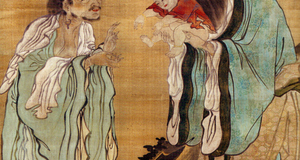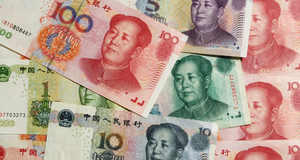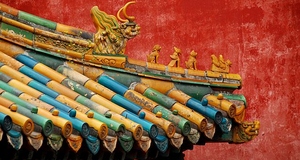Featured Article:The "Great Divergence" Redefined: the Rise and Fall of the West and the Recovery of China
By
2014, Vol. 6 No. 09 | pg. 3/3 | « China Falls Behind The WestWhy did China begin to lag behind the West during the past two centuries? There were two major reasons why China began to lag behind the West during the past two centuries. First, the Chinese were arrogant and believed themselves to be superior to all other foreigners. Second, China had a conservative Confucian-based bureaucracy governing the state. As such the bureaucracy stressed that the most important duty to its people was to ensure the maintenance of the Chinese State. This meant to continue to stress the Confucian values of harmony and balance. Concerning China's superiority complex, the Chinese believed they were far superior to the rest of the world. Even the Chinese word for "China," means Middle Kingdom (中國), for the Chinese believed themselves to be the center of the world. The primary reason for this belief in superiority was that China was the most productive area of comparable size anywhere in the world. The empire was larger than all of Europe in size, more populous, and did a far greater volume of trade. In fact, until the turn of the 18th century during the Qing Dynasty (1644–1911) China held the world's largest market because domestic trade and trade between provinces, which were the size of many European states, was far greater than foreign trade. The fact that Western Europeans traveled to China because they wanted Chinese goods (i.e., porcelain, silk, tea, spices) encouraged this belief in superiority. As the Italian Jesuit missionary Matteo Ricci reported in the seventeenth century, "Everything which the people need for their well-being and sustenance . . . is abundantly produced within the borders of the kingdom." 28 Second, the Chinese had a conservative, Confucian-based bureaucracy dedicated to preserve order and maintain the state so that it remained stable. The Chinese saw their interests best served by further embellishing their home base rather than extending their control over foreigners (those not Chinese). For instance, the Chinese had no desire of colonizing other peoples as the West did. The Chinese believed that if they did, they would have to take care of its non-Chinese inferiors rather than focus its attention to their own citizens. If they did venture out to trade with other peoples it was merely to enhance the wealth of their kingdom. The Chinese vied Westerners as barbarians; however, more importantly the Chinese viewed them as potential corruptors of Chinese morality and Confucian virtues.29Although China's conservatism and Confucian–based anti–commercialism did not prevent basic growth in the economy, the rigid system of Confucian autocracy make it difficult and less able to respond to change or the need for change. The priorities of the imperial state tended to be focused on the maintenance of order and balanced development rather than narrow profit-making and industrialization. The state was resistant to excessive income differentiation and marked displays of extravagance, which were seen as inimical to Confucian values of harmony. The state did not block market activities and commerce—on the contrary, it strongly supported the development of an agrarian market economy—but it did not, for the most part, promote commercial capitalism, except for those merchants engaged in the monopolies for salt and foreign trade.30 An example of how this arrogant thinking and conservative views is visible with China's sudden withdrawal of its navy from the Indian Ocean in 1500. During the Ming Dynasty (1368–1644), between 1405 and 1433, Admiral Zheng He launched seven remarkable two-year long naval expeditions. In preparation for these maritime voyages, "between 1404 and 1407, around 1,681 ships were built, the largest—the gigantic nine-masted 'Treasure Ships' of Admiral Zheng He—were about 400 feet long and 160 feel wide, longer than a football field."31 The other ships of the fleet were composed of much smaller merchant trading vessels and warships. In the autumn of 1405, China launched the largest fleet of ships the world had ever seen. The armada consisted of over 300 ships manned by 27,000 sailors. In fact, it was the largest the world would see for another 500 years. Yet unlike in Western Europe, Zheng's missions were neither colonial nor exploratory.32 The economic motive for these huge ventures was certainty a factor; however, the chief aim was primarily political, to "show the flag" to impress all other countries in the world and command respect for the Chinese empire.33 As Rhodes Murphey explains, Such exploits of seamanship and exploration were unprecedented in the world. Their grand scale and imperial pretension—as well, perhaps, as their commercial ambition—were an expression of new imperial pride and vigor. But they contributed little to the economy expect temporary employment for shipbuilders and crew, and they made no lasting impression on the Chinese mid, except to further confirm their sense of superiority as the only civilized empire.34 The sudden withdraw of the world's most powerful navy on earth from its domination of the Indian Ocean is not clear and scholars have not come to a general consensus. However, the desire to protect the Chinese state from its foreign invaders is a compelling argument. According to Robert B. Marks, he argues that the threat of the Mongols in the north threatened the security of the Chinese people and the voyages were abandoned and it seemed that the Chinese believed that their resources needed to be applied to this greater threat.35 Essentially, the Confucian value to maintain harmony and balance to ensure the existence of the state was the primary reason for the withdrawal of China's navy. Confucianism in the Business WorldSo, how do we explain the recent return of China to global prominence? Interestingly, Confucianism both impeded China's economic progress, allowing the West to surpass China, yet it also facilitated China's sudden rise in economic success. According to Confucian beliefs, merchants unproductive, uncultured, and preoccupied with profit rather than the good of society. However, Gary Kok Yew Chan, a Professor of Law at Singapore Management University, explains Confucius in his teachings did not actually condemn those for profit- making activities unless it was for selfish purposes and harmful to the community36. Even dating back to the Ming Dynasty (1368–1644), the state reluctantly believed that merchants were a necessary evil. Some Confucian thinkers even commended commerce as necessary for the well-being of society.37 It is clear that Confucianism has affected and continues to affect the commercial industry of China up to today. According to Giovanni Arrighi, in Adam Smith in Beijing (2007), Confucianism stresses maintaining balance within the family, harmony within the state, and by extension, the commercial market. The Chinese (Confucian) model of the type of market-based economic development, according to Adam Smith (1723–1790), who is widely considered the pioneer of political economy, believed that China's economy was far superior to the European model and was "much more advisable for governments to pursue." In fact, Smith even argued that even the late imperial China was the exemplar of market based economic development.38 So, Arrighi has provided an answer for this 18th century question; however, there still remains the question of how Confucianism Confucian ethics has much to contribute to today's current business ethics, the proper conduct of businesses and businesspeople. Edward J. Romar, Professor of Marketing and Management at University of Massachusetts Boston, believes there exist several reasons why Confucianism serves a persuasive managerial ethic which makes modern Chinese businesses function efficiently applies to the modern world: 1) Confucianism is compatible with accepted managerial practices, 2) It requires individuals and organizations to make a positive contribution to society, 3) Recognizes hierarchy as an important organizational principle and demands managerial moral leadership, 4) The Confucian "Golden Rule" and virtues provide a moral basis for the hierarchical and cooperative relationships critical to organizational success.39 According to Po-Keung Ip, Professor and Director of Applied Ethics Center, Graduate Institute of Philosophy, National Central University, Taiwan, describes the following core principles that serve as the foundation of a "Confucian Firm": 1) The goals, strategies, and practices of the firm should be defined by the principle of ren40–yi41–li.42 2) The structure, processes, and procedures of the company should confirm to ren–yi–li. 3) The major stakeholders should be treated with ren–yi–li. 4) The leaders should conform to the thoughts and deeds of Junzi.43 5) Members of the firms are obligated to be virtuous and act in accordance with ren–yi–li.44 Po Keng Ip argues that the "Confucian Firm" is essentially a virtue-based firm. People's virtues or moral character—not rules and regulations—are the principal driver of moral actions and decisions. Rules and regulations are secondary to that of virtues in shaping actions and guiding decisions. Rules are invoked only if they can aid and enhance moral actions and decisions. The "Confucian Firm" would treat its major stakeholders—employees, customers, shareholders, etc. with compassion and rightness. Leaders and people in positions of authority would emulate Junzi in conducting a virtuous corporate life and in exercising virtuous leadership. In the real world, this set of core principles can help spawn a variety of corporations that exhibit similar key Confucian characteristics, and thus broadly be labeled as a "Confucian Firm." In reality, there is no one single form of a Confucian Firm, but a variety of Confucian Firms sharing these core elements.45 More research remains to be done, but if Po-Keng Ip is correct, Confucianism remains relevant and applicable for modern business culture. ConclusionHistorically, China held a significant position of world power up until the 19th century. However, for the last two hundred years the West has dominated the world technologically, economically, politically, and its people have experienced the most social advancement out of all other world civilizations. The point at which this began is often termed the "Great Divergence." Scholars have provided their own explanations why the "Great Divergence" occurred (environment, geography, agriculture, population size, social organization, and technology); however, one of the major reasons for the "Great Divergence" is because of an underlying "Cultural Divergence," which began as far back as in the "Axial Age" (c. 800-200 BCE). This "Cultural Divergence" was due to the beginning of the western philosophies of Socrates, Plato, and Aristotle in contrast to that of Confucius in China. Understanding this "Cultural Divergence" is relevant today because it may help explain China's lag behind the West, its recent ascent in economic power, and the impact of this cultural perspective in business. Currently, a steady change has been developing in China. China has not only caught up to the West but its economy is continuing to accelerate at a rapid rate and may even surpass the West in the near future. The return of China to global prominence is in part related to the embrace of Confucian principles in modern businesses. Cultural differences are the underlying, primary, and fundamental drivers of how the West and the East responded to their own differing opportunities. Endnotes1.This term was taken from a book by Samuel P. Huntington, Clash of Civilizations and the Remaking of World Order (New York: Simon and Schuster, 1996). 2. Eurocentrism is the idea that "European civilization – 'the West' – has some unique historical advantage, some special quality of race or culture or environment or mind or spirit, which gave this human community a permanent superiority over all other communities, at all times in history and down to the very present, see J. M. Blaunt, The Colonizer's Model of the World: Geographic Diffusionism and Eurocentric History (New York: Guilford Press, 1993), 1. 3. Jared Diamond, Guns, Germs, and Steel: The Fates of Human Societies, (New York: Norton, 1999), 352. 4. Ibid., 25. 5. Ibid., 87. 6. Robert B. Marks, Origins of the Modern World: A Global and Ecological Narrative from the Fifteenth to the Twenty-first Century, 2nd ed. (Lanham: Rowman & Littlefield, 2007), 13. 7. Ibid., 11. 8. Ibid., 151. 9. Ibid., 12-13. 10. Ibid., 11. 11. Ibid., 12. 12. The "European Miracle" is related to the idea of "Great Divergence"; however, instead it focuses on the process of the rise of the West and not its origins. The term "European Miracle" is taken from a book by E. L. Jones, The European Miracle: Environments, Economies and Geopolitics in the History of Europe and Asia. (Cambridge: Cambridge University Press, 2003); "The European Miracle' is the notion that Europe was more advanced and the more progressive than all regions prior to 1492, prior, that is, to the beginning of the period of colonialism, the period in which European and non-Europe came into intense interaction," see Alan R. H. Baker, Geography and History: Bridging the Divide (Cambridge: Cambridge University Press, 2003), 182. 13. David S. Landes, The Wealth and Poverty of Nations: Why Some Are So Rich and Some So Poor (New York: W. W. Norton, 1999), 516. 14. Richard Peet, review of The Wealth and Poverty of Nations: Why Some are so Rich and Some so Poor, by David S. Lands, Annals of the Association of American Geographers, Vol. 89, No. 3 (September, 1999): 559-560, accessed 07 June 2012, http://www.jstor.org/stable/2564501. 15. Jacques, Martin. "Martin Jacques: Understanding the rise of China," filmed October 2010, TED video, 21:31, posted January 2011, http://www.ted.com/talks/lang/en/martin_jacques_understanding_the_rise_of_china.html. 16. Ibid., (emphasis mine). 17. Jacques Martin, When China Rules the World: The End of the Western World and the Birth of a New World Order (New York: Penguin, 2009), 124. 19. David L. Hall and Roger T. Ames, "Introduction: Anticipating the Argument, 1. Clearing a Path To China," Anticipating China: Thinking through the Narratives of Chinese and Western Culture (New York: State University of New York Press, 1995), Google E-Book. 20. Conrad Schirokauer and Miranda Brown, A Brief History of Chinese Civilization, 2nd ed. (Belmont: Wadsworth, 2006), 33. 21. Archie J. Bahm, The Heart of Confucius: Interpretations of Genuine Living and Great Wisdom, 2nd ed. (New York: Walker/Weatherhill, 1970), 13. 22. Roger T. Ames and Henry Rosemont, Jr, The Analects of Confucius: A Philosophical Translation (New York: The Random House, 1998), 19. 23. Andrea and Overfield, "Confucianism in China and Japan," in The Human Record: Sources of Global History, Volume II: Since 1500 7th ed. (Boston: Wadsworth, 2012), 112-113. 24. Ames and Rosemont, Jr., 22-23. 25. Ibid., 21. 26. Xinzhong Yao, An introduction to Confucianism (New York: Cambridge University Press, 2000), 34. 27. Ibid.,1. 28. Rhoads Murphey, East Asia: A New History, 5th ed. (Upper Saddle River: Longman, 2010), 129. 29. Ibid., 164. 30. Martin, When China Rules the World, 51. 31. Marks, 47. 32. Martin, When China Rules the World, 370. 33. Marks, 46. 34. Murphey, 128. 35. Marks, 48. 36. Gary Kok Yew Chan, "The Relevance and Value of Confucianism in Contemporary Business Ethics," Journal of Business Ethics, 77 (2008): 350, doi: 10.1007/s10551-007-9354-z 37. Andrea and Overfield, "Merchants in the Confucian World," in The Human Record: Sources of Global History, Volume II: Since 1500 7th ed. (Boston: Wadsworth, 2012), 129. 38. Giovanni Arrighi, Adam Smith in Beijing: Lineages of the Twenty-First Century (London: Verso, 2007), 69. 39. Edward J. Romar, "Virtue Is Good Business: Confucianism as a Practical Business Ethic," Journal of Business Ethics, part 2, vol. 38, nos. 1/2 (June 2002): 119, Business Source Complete (12128569). 40. Roger T. Ames and Henry Rosemont Jr. translate "ren ä»" as follows: "ren is most commonly translated as 'benevolence, 'goodness,' and 'humanity,' occasionally as 'humanheartedness, and less occasionally by the clumsy and sexist 'manhood-at-its-best.' While 'benevolence' and 'humanity' might be more comfortable choices for translating ren into English, our decision to use the less elegant 'authoritative person' is a considered one. First, ren is one's entire person: one's cultivated cognitive, aesthetic, moral, and religious sensibilities as they are expressed in one's ritualized roles and relationships," see Ames and Rosemont Jr., 66. 41. Ames and Rosemont Jr. explain wants to make a clear distinction of the translation of "yi義": "The distinguished scholar D. C. Lau translates yi sometimes as 'right,' other times as 'duty,' and on occasion as 'moral' or 'morality' more generally. If one is committed, as Lau is, to portraying Confucius as a 'moral philosopher' in more or less the Western sense, then yi is probably the best candidate as a Chinese lexical equivalent for 'morals or 'morality.' But the term 'morality' in contemporary English, and particularly in post-Kantian ethics, is linked intimately with a number of other terms: 'freedom,' 'liberty,' 'choice,' 'ought,' 'individual,' 'reason,' 'autonomy,' 'dilemma,' 'objective,' 'subjective.' None of these English terms has a close analogue in classical Chinese, and hence in the absence of these associations, we are skeptical of using 'morality' for yi . . ." Instead, yi is better translated as "appropriateness," what is considered as the most appropriate action in conducting business, see Ibid., 70, 71. 42. According to Ames and Rosemont Jr., "'li 禮', has been translated as 'ritual,' 'rites,' 'customs,' 'etiquette,' 'propriety,' 'morals,' 'rules of proper behavior,' and 'worship.' . . . Li are those meaning-invested roles, relationships, and institutions which facilitate communication, and which foster a sense of community." In this situation, in a business scenario, Li best is translated as 'authoritative conduct,'" see Ibid., 66, 69. 43. "Junziå›å" in this sense would be broadly defined as a "gentleman"; however to avoid a sexist term, and more importantly the appropriate translation in a situation where proper business conduct is concerned, it junzi means "exemplary person," see Ibid., 78. 44. Po-Keung Ip, "Is Confucianism Good for Business Ethics in China?,"Journal of Business Ethics, 88 (2009): 467, doi:10.1007/s10551-009-0120-2. 45. Ibid., 468.
Suggested Reading from Inquiries Journal
Inquiries Journal provides undergraduate and graduate students around the world a platform for the wide dissemination of academic work over a range of core disciplines. Representing the work of students from hundreds of institutions around the globe, Inquiries Journal's large database of academic articles is completely free. Learn more | Blog | Submit Latest in History |


















